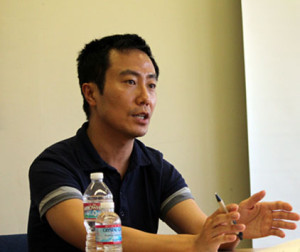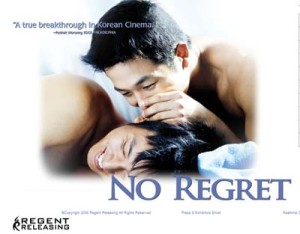The Complicated Lives of Gay Men in South Korea: “The main issue of being a gay man in South Korea was how to find a boyfriend and a gay community, the two things that create the basis for a gay life. People do not come out due to their emotional closeness to their families. According to anthropologist John Cho, single gay men in South Korea retreated from gay life in the wake of the 1997 Asian banking crisis and began to concentrate on making money, while married gay men became much more active in the gay community.”
 International Institute, UCLA
International Institute, UCLA
April 2, 2013
After a decade of sexual freedom as homosexuals in the 1990s, said anthropologist John Cho, single gay men in South Korea became consumed by financial worries following the 1997 Asian banking crisis (also known as the “IMF crisis”). Cho, who spoke at a lecture organized by the Center for Korean Studies, noted after this crisis, single gay men in their thirties and forties retreated from gay life to concentrate on making money, while married gay men began to play a much more active role in the gay community.
In the absence of the “fence” of the family (an exclusive group of belonging that helps people navigate the adversities of life), single gay men began to regret the time they had spent on love in their youth, said Cho, feeling they could no longer afford “the luxury of love.” The speaker, who conducted his research in South Korea between 2007 and 2009, explained that many single gay men then incurred big risks, either by changing careers or by taking significant gambles in their pursuit of higher income. Some even turned to heterosexual marriage out of loneliness and a desire to live a “normal life like everyone else.”
Growing up in the 1970s and 1980s, said Cho, there was little information about homosexuality in South Korea and most of it was negative. In the 1990s, he explained, the media began to cover gay issues and TV shows began to include gay characters—exposing South Koreans to more information about homosexuality. In fact, many married men realized at this time that they were gay, a notion that they had previously resisted or had been unable to articulate.
In that era, said Cho, “queer globalization” introduced notions of liberal individualism into a society that stresses the importance of family and marriage. In a country where many people still believe that homosexuality is a foreign phenomenon, the speaker explained that these changes encouraged single gay men to express their sexual identities and pursue love relationships. However, the idea of “coming out” was never an issue; the assumption, he said, is that everyone remains in the closet.
Cho claimed the main issue of being a gay man in South Korea was how to find a boyfriend and a gay community, the two things that create the basis for a gay life. People do not come out due to their emotional closeness to their families, he explained, as doing so would be a cause of shame. He added, “The saying is, ‘only orphans come out.’” That is, only after his parents have died can a single gay man live a more openly gay life. Cho noted that it was a sad irony of filial duty that single gay men refrain from telling their parents about their sexual orientation, yet wait for them to die.
The speaker traced the advent of the “bats” (married gay men) to the rising divorce rate in the South Korea and the advent of “geese fathers”—fathers who live alone in South Korea while their wives and children live abroad in order to ensure the children’s educations and future success. Suddenly, these men had much more free time and the freedom to participate in gay life. Cho noted that South Koreas tend to view homosexuality as a kind of free-floating desire that can attach itself to anyone, observing that several of his research subjects confessed to being “overtaken” by their true sexual feelings in the absence of their families.
According to Cho, the “bats” live complicated double lives in which their gay and straight lives are strictly segmented, with their families and jobs taking precedence over their boyfriends. Nevertheless, they value these relationships and consider them necessary to express their true sexual identities. Living such a life requires hyper-vigilance on their part: a process of constant self-scrutiny and endless attempts to look and act “straight.” Cho drew particular attention to what he called their “de-evidentiary” practices, such as the reading and/or sending, but then immediately deleting, text messages, voice mails, emails and electronic pictures.
Describing married gay men in South Korea as “good husbands, dutiful lovers, and gentle fathers,” Cho explained that the bats were devoted to their families and even educated themselves on female sexuality to please their wives. He pointed out that these men could participate in gay life because they were married, as marriage and family give them financial and social security. Single men without families, on the other hand, are looked at with suspicion in the business world—an opinion shared by some of Cho’s research subjects!—while married men advance.
Having a family thus assures gay men the means to frequent gay clubs with their boyfriends. They have to have all three of these components (career, family, boyfriend), said Cho, they can’t give up one. He claimed that although gay married men and their single boyfriends were in assymetrical relationships, both paid high emotional and political costs in their adaptation to a very masculine, family-oriented culture.
 (Photo right: ‘No Regret’: breakthrough gay Korean film; 2006)
(Photo right: ‘No Regret’: breakthrough gay Korean film; 2006)
Story from: UCLA International Institute
http://www.international.ucla.edu/news/article.asp?parentid=131293
April 10, 2013
Center for Korean Studies
(Photo of John Cho: Peggy McInerny, International Institute.)
——–
Also see:
-http://www.news.com.au/world-news/south-korea-easing-homophobic-views-on-news-of-gay-wedding/story-fndir2ev-1226655223769
–http://thethreewisemonkeys.com/2010/10/25/choe-seung-ja%E2%80%99s-%E2%80%9Clove-in-this-age%E2%80%9D-exploring-a-modern-same-sex-poet/
-http://www.refworld.org/docid/4b7cee8137.html
–http://ilga.org/ilga/en/article/o6rWlKs1Yz
-http://ilga.org/ilga/en/article/o5FWvBs1q2
-http://ilga.org/ilga/en/article/nxGF74X1Lc
















